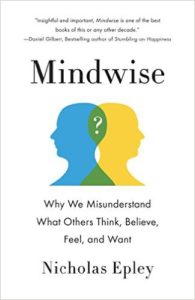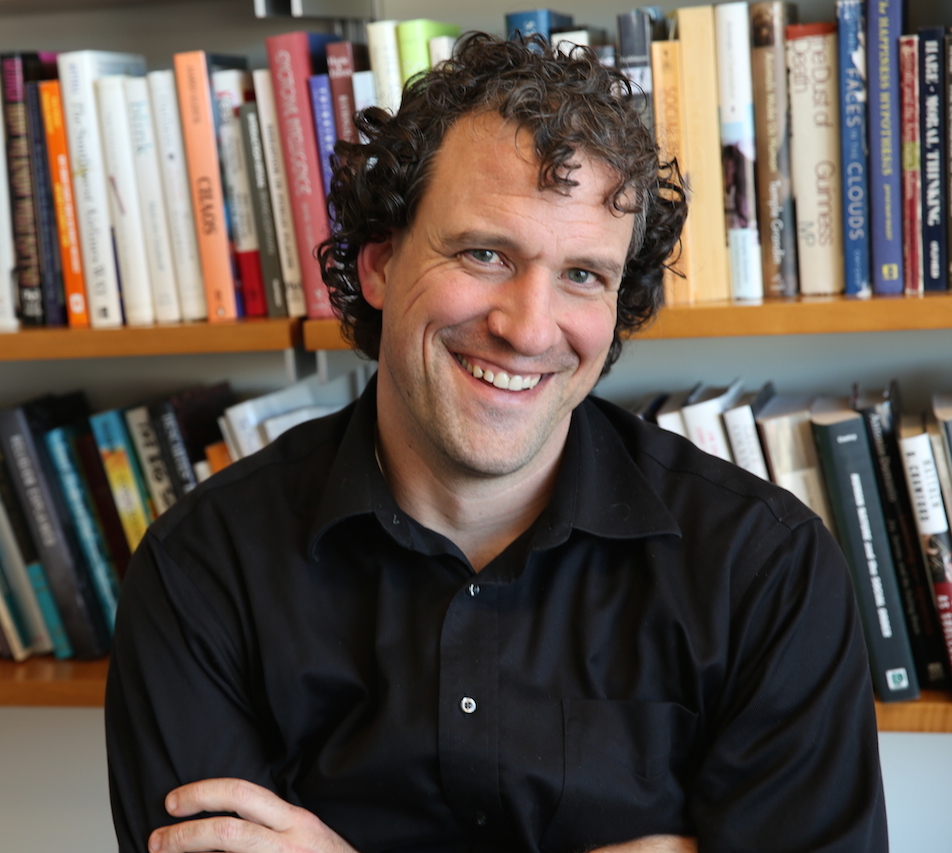I’ve been reading A LOT of psychology books recently. I’m always a bit skeptical of psychology-related books. Some of them turn out to be bullshit. Others offer life-changing insights.
Usually, I’ll only buy books that I’ve heard mentioned on various podcasts. But, I found this book in Barnes and Noble after scanning the psychology section and decided to pick it up.
 Personally, I found a few nuggets of wisdom in the book Mindwise by Nicholas Epley. While I have heard some of the basic psychological experiments that were mentioned, there were other things that I’ve never heard of before.
Personally, I found a few nuggets of wisdom in the book Mindwise by Nicholas Epley. While I have heard some of the basic psychological experiments that were mentioned, there were other things that I’ve never heard of before.
Before I get into my review and takeaways, I wanted to comment on two Amazon reviews that the book got.
“The topic is very interesting to me, the writing style however was not and I found myself picking up the book only to put it down a few pages later over and over because it just felt too dry and smug to me. Reading it felt like it does when you have a conversation with someone who insists on using big words instead of common ones because they think it makes them look smart. I ended up not finishing it.” – See comments.
I think that books have to broken down into two categories: those that you read for pleasure, and those that you read because you want to learn something.
When I’m reading a book to learn something, I don’t care about the style of the writing or whether or not it’s communicated in an interesting manner. Other people do, and that’s 100% okay. For me, I just focus on the takeaways and evidence supporting these ideas.
Some books sound scholarly and the author chooses to use big words. Others aren’t. I don’t think one is better than the other. It’s just the writing style.
Another review reads, “The overall takeaway I got from this book is that people will look at things from their own perspectives, and we are wrong to simply conclude that another person’s decisions are stupid or evil. I think most readers have heard that before, so the thesis of the book is nothing profound.” – See reviews.
Other negative reviews that I read went on to say that they wished the book was shorter. I’ve actually noticed a theme of Amazon readers wishing that books were shorter.
I think that some of the principles in psychology seem “simple” or “easy to recognize,” but in reality they are deeply profound. As Shay Carl says, the secrets to life are hidden behind the word cliche.
Many times, I will read books to reinforce ideas and beliefs that I’m having trouble remembering. I don’t just read them to obtain new information. Still, everyone is different.
Next, I’m going to discuss a few of my takeaways after reading this book!
1. Look to actions, not words
Most people would say that it’s a no-brainer to focus on the actions of the people around them and themselves in order to judge their future behavior, attitudes, etc.
But, I’m willing to bet that those same people, myself included, rarely follow that logical path when making judgements.
We tend to overvalue our own thoughts and those of other people and devalue the actual actions that we’ve taken towards a goal or that show our beliefs.
“There can be a significant disconnect between what people think about themselves and how they actually behave.” In short, people are bad at predicting how they will feel in given situations.
Steve Jobs and many of the famous innovators knew this. You can’t listen to what people say. You can only observe their behavior.
“No psychologist asks people to explain the causes of their own thoughts or behavior anymore unless they’re interested in understanding storytelling.
You can ask people what they are thinking or feeling or wanting – the finished product of some mental processes – and expect to get a solid answer, but asking why they think or feel or want invokes nothing but theoretical guesswork.”
The reason that people suck at knowing what they want, how they feel, or who they really are is that we’re great at rationalizing but horrible at understanding how our beliefs, intentions, and attitudes are formed or impacted.
“When you think one thing about yourself and the truth is another, what are you failing to know about yourself? One word: construction. You are consciously aware of your brain’s finished products – conscious attitudes, beliefs, intentions, and feelings – but are unaware of the processes your brain went through to construct those final products, you are therefore unable to recognize its mistakes.”
Marketers can exploit this connection that every human being makes between observable action and thought. Just because someone smiles, we assume that they are happy or like whatever they’re doing.
“If you see someone smiling at a carton, you will assume that they find it funny.”
But, it’s not true. Be aware of this the next time you watch a commercial or talk with a salesman.
2. We all dehumanize to avoid feelings
Most people who have read a psychology book are familiar with the concept of dehumanization. However, I don’t think we’re aware about the degree to which we all do it.
When you don’t perceive someone as “cut of the same cloth” as you or 100% exactly the same as you are, you give yourself permission to treat them differently.
It brings to mind this quote, “Perceiving the Poncas as mindless, after all, is what had made it possible for officials to treat them as property under the law rather than as persons…
The essence of dehumanization is, therefore, failing to recognize the fully human mind of another person.”
The more you are psychologically distant from someone, the easier it is to dehumanize them. The only way to view someone else who appears dissimilar to you as not human is to fail to empathize with them. In order to empathize, you must consciously see someone else’s perspective and imitate another person’s actions and body language in order to get a sense of how they are feeling.
When we’re not in sync with another person we have a “tendency to assume that others’ minds are less sophisticated and more superficial than one’s own.”
After reading this section on how we distance ourselves from other people in order to avoid feelings of empathy or closeness, I was profoundly struck by the quote below.
“Your humanity comes from the way you treat others, the idea goes, not the way you behave in isolation. Humanity comes from treating others as human beings not in the biological sense of having a fully human body, but in the psychological sense of having a fully human mind.”
3. Happiness in a Social Setting.
This is the area of my life that I’m working on right now. A lot of what Epley had to say really resonated with me. To you, they might be obvious.
“In one large survey of happiness, for instance, having positive relationships with friends and family members was the only necessary ingredient for being very happy.”
While I understand that from an intellectual perspective, the actions that I used to take in my life were not congruent. I think a lot of people have this problem. We “know something,” but don’t take action on it. Or, we simply ignore it.
There was this great commuter experiment in the book which talked about the social standards when you’re among strangers. “We found that people had a more positive experience when they connected with their neighbor regardless of whether they tended to be outgoing or shy, open or reserved.”
Knowing this gives me a bit more confidence when striking up a random conversation in the subway. I’m not the only one that is simply looking for a distraction from boredom, and would probably rather talk with another human being that just play a game.
It seems like we also over-emphasize the degree to which our embarrassing moments are witnessed and remembered. “In all of the cases we ever studied, those in the throes of an embarrassing moment consistently overestimated how harshly others were evaluating them.” I bet you can’t recall own school commencement speaker or most of their speech.
Lastly, this section discussed stereotyping and how we tend to stereotype when someone is a member of a particular group. Also, when looking at a group, you tend to pick up on the gist of a group of people, but not the individual members.
4. We think that others think like us. They don’t.
Men and women feel the same reactions and on average the same level of intensity. But, they vary greatly in the expression of their emotion, which infers that women are feeling more because they are showing more emotion than men. In reality, we both feel emotions strongly.
“When you know very little about someone, the gaps in your knowledge are filled in by information about who a person is. But when you know more, that stereotypical knowledge seems to be quickly supplanted by what a person does.”
People assume that a person’s mind corresponds to their observed actions. Think of behavior at a bar or in a social setting. Body language can communicate confidence, even if you’re not confident in your life. You could also have bad body language if you’re a billionaire and make people think you’re not confident, even if you ARE confident in your life.
There was also a really interesting section about celebrities and how people assign actors the traits of the characters that they portray in movies, like Spock being logical in Star Trek.
Finally, this last quote that I’ll share resonates SO MUCH. I can’t tell you the number of times that this has happened to me.
“Not only are shy people commonly misinterpreted as arrogant rather than anxious, but their anxiety also keeps them disconnected from the very relationships that could increase their happiness.”
Conclusion
Go pick up a copy of this book! There is so many more insights and takeaways that I had. People always assume that just because you’ve heard about one study in a book that the book is bad. I don’t judge books on 100% originality. I judge them on how they impacted my life.
Again, many times I will read books to simply reinforce beliefs that I want to embody or that I’m looking to acquire. I wonder if other people do that too. Let me know if you do in the comments below!

Salvador, great review! We always have preconceived ideas about how people should behave or conduct themselves rather than embracing the fact that we are all individuals, however we need to comply with certain basic life principles. Respect for one another and doing the common good, but our brains are very sensitive and responds differently to the smallest signals associated with something that resembles an abnormal behaviour then we dehumanise without allowing our minds to shift to exploratory mode…We are becoming more like programmed machines! Thank you!